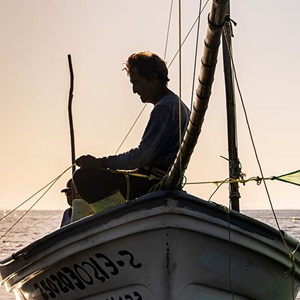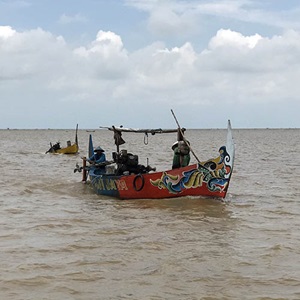Supporting the Indonesian blue swimming crab fishery to make the improvements needed to meet the MSC Fisheries Standard.
- Development of plan to rebuild crab stocks
- Improved awareness of ghost fishing and how to reduce interactions with endangered species
- Regional committees established to improve fishery governance
Completed: September 2022
£49,353
Transition Assistance Fund
Awardee
Asosiasi Pengelolaan Rajungan Indonesia (APRI)
Fishery
Indonesia Madura Island blue swimmer crab trap fishery
Blue swimming crabs are a valuable commodity and were heavily exploited throughout the 1990s. This led to a decline in the stock and average size of the crabs, impacting the local ecosystem and coastal communities which depend on the fishery for their livelihoods.
The fishery is currently working to improve its environmental performance and meet the MSC Standard for sustainable fishing. In 2020, the fishery joined the In-Transition to MSC program, which supports fisheries making verifiable progress towards MSC certification.
Rebuilding crab stocks
Support from the MSC's Transition Assistance Fund has helped the fishery develop a plan to rebuild crab stocks.
This includes the implementation of a well-defined harvest strategy, to ensure stocks are fished at a sustainable level. Fishers are now required to register their vessels, and a tracking system has been used across several provinces to map the fishing grounds.
The mapping exercise allowed sensitive crab habitats and nursery grounds to be identified and led to the development of plans for new conservation zones in central and east Java.
Fishers were also trained to recognise and safely handle juvenile crabs and ‘egg-berried’ females, resulting in fewer being caught.
Reducing ghost fishing and bycatch
Crab traps were modified to improve selectivity and successfully trialled across different regions. Modifications included adding escape vents and increasing the size of the net mesh to allow juvenile crabs and smaller species to escape.
APRI ran a campaign across the fishing communities to raise awareness of the risks of ghost fishing and how to prevent gear loss. This included the distribution of posters at key areas within the fishery, such as landing sites.
The fishery also started collecting and analysing data on bycatch and interactions with endangered, threatened and protected (ETP) species. This includes training for fishers to help them recognise ETP species and handle them safely.
Improving fishery governance
Improvements have also been made to the management of the fishery. A blue swimming crab fisheries management council was established in East Java and developed harvest control rules and an action plan for making improvements. These measures have been approved by the region’s Agency of Marine Affairs and Fisheries.
A further management council has now been established in a different region of the Java Sea (Fishing Area 712), helping to drive improvements on a wider scale.
Steps have also been taken to improve monitoring and compliance through the creation and distribution of logbooks. This will enable fishers to record catch data, and information relating to interactions with ETP species and ghost gear.
New grant awarded
The fishery successfully applied for further funding from the MSC’s Transition Assistance Fund. The grant was awarded in October 2023 and recognises the fishery’s progress against its action plan. The funding will enable the fishery to continue to make the improvements needed to meet the MSC Fisheries Standard.
These improvements include:
- Continuing to rebuild the crab stock and collecting additional data to support improved stock assessment.
- Improve the selectivity of fishing gear to reduce bycatch and develop measures to safely handle bycatch species, including endangered, threatened and protected species.
- Improve fishery management measures at local and national levels relating to decision-making, enforcement and compliance.
The fishery is expected to complete these improvements and enter assessment against the MSC Fisheries Standard by December 2024.




